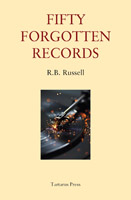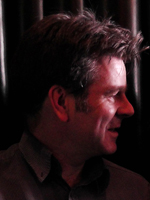R.B. RUSSELL

AND OTHER CHARACTERS OF QUESTIONABLE FAITH
T. Lobsang Rampa’s autobiography, The Third Eye was an international bestseller in 1956, but the author had to face some awkward questions from critics. There were two possibilities; either he really was a Tibetan lama whose third eye had been physically opened (and who could reveal secrets of levitation, invisibility, gilded extraterrestrials, giant temple cats, etc), or he was really the eccentric son of a plumber from Plympton in Devon.
Russell’s biography of Rampa is accompanied in this volume by three further studies of alternative belief systems that have fascinated him over the years. The subjects are
the Brotherhood of the Cross and Star, the Church of Scientology’s Oxford Capacity Analysis test, and the Temple of Psychic Youth

Ray Russell was not at the crossroads when Robert Johnson met the devil, and he didn’t see Elvis Presley perform live. He wasn’t at Woodstock, or Altamont, or on the roof of the Apple Building. To his enduring frustration, he didn’t get to see The Sex Pistols in Manchester at the Lesser Free Trade Hall in June 1976, because he was only ten years old.
There will be many others who are just as passionate about music as Russell, who also failed to be in the audience at seminal moments in music history. But, like him, they own records that mean the world to them, and have seen bands play who blew them away. The point is, we all treasure our own personal musical histories because they enrich our lives. This book is a celebration of being a committed music fan.
He formed a band at seventeen and discovered he couldn’t sing. Close friends released a record which used his lyrics, but John Peel played another of their songs. He ran a record label for a month, worked in a record shop and has released a few records of his own music.

When a body falls on to the roof of Tanya Sewell’s house in the middle of the night, the world’s media arrives, demanding answers. Tanya recognises the woman as her old friend, the literary researcher Catherine Richards, but where did she come from and how did she end up on Tanya’s roof?
The reporters move on, but Tanya is unable to, not least because she has inherited Catherine’s house, which is full of more books than Tanya could imagine any one person owning.
But there is another remarkable development, and Tanya finds herself caught up in a confusion of space and time, books and authors, fact and fiction, all of which seem to be the result of the mysterious Sixtystone, an artefact referred to in the fourteenth century by a third-century geographer, Solinus, and in the fiction of the nineteenth-century author Arthur Machen.
About R.B. Russell

R.B. Russell is a publisher, co-running Tartarus Press with Rosalie Parker. He writes novels, short stories and non-fiction, and composes music.
As an author he has had four collections of short stories, three novellas and one novel published. His story 'Loup-garou' was chosen for Ellen Datlow’s The Best Horror of the Year. 'In Hiding' was nominated for the 2010 World Fantasy Award, and 'The Beautiful Room' for the 2011 British Fantasy Award.
Michael Dirda has described Russell as '...among the leading practitioners of classic supernatural fiction'.
Russell's novella, Bloody Baudelaire, has been filmed by 3:1 Cinema with the new title Backgammon and was released 2016.[10]
Russell is also a songwriter, having previously composed songs released by The Bollweevils. His first solo CD, Ghosts, was released by Klanggalerie in February 2012. The accompanying video presentation was premiered in Vienna in March 2012, and was subsequently shown at Dean Clough Galleries October 2012. Dean Clough Galleries presented The Romance of Shortwave Radio Numbers Stations as a video installation in 2018.